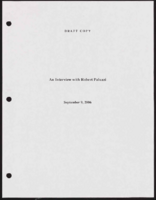Search the Special Collections and Archives Portal
Search Results

Morgan H. Mills interview, March 26, 1981: transcript
Date
Archival Collection
Description
On March 26, 1981, Matthew A. Carr interviewed Morgan Mills (b. July 27, 1914 in Grand Junction, Colorado) about his life in Boulder City, Nevada and his work at the Boulder (Hoover) Dam site. Mills speaks primarily about his time working on the dam as a mechanic with the United States Bureau of Reclamation, as a tourist guide with the Boulder City Tourist Bureau and as a musician in local bands. Moreover, Mills speaks about attending the University of Nevada, Reno and playing music there. Lastly, he talks about the Great Depression, how it affected Las Vegas and Boulder City, the development of different infrastructure and the speakeasies in Boulder City during the Prohibition era.
Text

Jack L. Monroe Jr. interview, March 15, 1981: transcript
Date
Archival Collection
Description
On March 15, 1981, Marie Carmichael interviewed Jack L. Monroe Jr. (b. 1937 in St. Helena, California) about his life in Las Vegas, Nevada and his work as a cook among many other topics. Monroe speaks initially about his time working alongside his family in the restaurant business, with his father working as a cook, his mother a waitress and himself as both a busboy and a cook. He discusses the working conditions of cooks, the competition between casino restaurants and the relationship between workers, bosses and the public. Moreover, Monroe speaks about life in Las Vegas as a youngster, the significance of YMCA, summer camps and other recreational activities, and the school system. Lastly, he talks about the changing infrastructure of the city, the paved roads and public transportation, how casinos made their profits and the attachment residents develop towards the city of Las Vegas.
Text

Loreta C. Monson interview, March 1, 1979: transcript
Date
Archival Collection
Description
On March 1, 1979, Jon J. Howard interviewed Loreta Monson (b. April 10, 1904 in Egypt, Idaho) about her life in Las Vegas, Nevada. Monson speaks about coming to Las Vegas, the layout of the city and Fremont Street. Moreover, Monson talks about the Mormon church in Las Vegas, politicians and Nellis Air Force Base. Lastly, Monson discusses leisure activities, recreational activities such as fishing, and the Old Ranch.
Text

Daniel A. Moore interview, March 3, 1979: transcript
Date
Archival Collection
Description
On March 3, 1979, Norwood Germany Jr. interviewed Daniel A. Moore (b. 1939 in Fort Worth, Texas) about his life in Las Vegas, Nevada. Moore begins by speaking about his move to Las Vegas from Utah at a young age, his education and his work in construction and at the Las Vegas McCarran Airport. Moreover, Moore speaks about his involvement with church and his recreational hobbies such as bowling. Moore also spends time speaking about the African American population in Las Vegas, the jobs available to them, racial tensions in his young adulthood versus his children’s experiences, and the segregation of black communities into the Las Vegas Westside. Lastly, he talks about the city’s growth, tourism and the economy, the development of different shopping centers and malls, and the city’s law enforcement.
Text

Lillian Morrison interview, 1996: transcript
Date
Archival Collection
Description
Lillian Morrison was the first uniformed female who worked for Park Service and has worked for Reclamation for 20 years during the war at Camp Williston. Morrison recalls life in Boulder City during the late 1930s and 1940s. Morrison is the wife of Lloyd Shorty Morrison.
Text

Transcript of interview with Patricia Mulroy by Claytee White, November 18, 2013
Date
Archival Collection
Description
Patricia Mulroy served Las Vegas as the general manager of the Las Vegas Valley Water District from 1989 to 2014. She served the state of Nevada as the general manager of the Southern Nevada Water Authority from 1993 to 2014. Patricia helped to build the Authority, and saw the state through the devastating drought of the Colorado River. Patricia was born in Frankfurt, Germany on February 24, 1953. As a young girl, she lived in several different countries, but always felt that the United States was her home. Her experiences abroad led her to develop a fascination with government work and state service. She arrived in Nevada in 1974 to attend UNLV. In 1989, Patricia became the general manager of the Las Vegas Valley Water District. She entered the field at a tumultuous time, facing the drought of the Colorado River and tension within the districts. She pioneered the Water Authority, which revolutionized southern Nevada’s water rights system and allowed the districts to deal with the is
Text

Transcript of interview with Robert Paluzzi by Claytee White, September 5, 2006
Date
Archival Collection
Description
Claytee White interviews Robert Paluzzi on September 5, 2006.
Text

Don Perry interview, March 05, 1978: transcript
Date
Archival Collection
Description
On March 5th, 1978, Karen Croteau interviewed Don Perry (b. 1928 in Clarksburg, West Virginia) about Paiute Indians and life on a reservation. Perry begins by mentioning his own Indian heritage with a Cherokee mother and his wife’s Paiute heritage. Perry focuses on his conversations with his wife’s grandmother, who lived on the Paiute reservation since birth, from who he learned about the reservations history. He particularly delves into the traditions of Indian burials, governing on the reservation, and the difference between an Indian reservation and an Indian colony. Additionally, he talks about recreation on the reservations, education of Paiute Indians, and how reservations have changed. Throughout the interview, Perry gives personal anecdotes about his life in connection to the Paiute people and his experiences with their traditions and belief systems. Perry ends by discussing governing politics of the Paiute reservation and the start of Las Vegas as a gambling town.
Text

Gwen Weeks Rahner interview, March 06, 1981: transcript
Date
Description
On March 6, 1981, Laronda D. Tinsley interviewed Gwendolyn Weekes Rahner (born August 14th, 1923 in Atlantic City, New Jersey) at her home in Las Vegas, Nevada. In this interview, Mrs. Rahner discusses working in politics and registering people to vote in Las Vegas, Nevada. She also discusses living in West Las Vegas and her experiences there.
Text

Transcript of interview with Ian and Irmalee Anne Ross, by Claytee White, March 28, April 5-6, 2012
Date
Archival Collection
Description
R. Ian Ross, better known as Ross, and wife Irmalee have dedicated their lives to serving, and improving, their community. Both Ross and Irmalee’s families moved to Las Vegas, from Los Angeles and Reno respectively, drawn by the opportunities presenting themselves in the growing city. While in college, Ross would spend his summers as busboy at the Sands hotel, where his mother worked as beauty consultant and salesperson. Ross attended law school, and soon after finishing, started a law firm with Jerry Snyder and Oscar Goodman. After a couple of years, Ross took a position with the City Attorney’s Office while also starting his own private firm. He later served as an assemblyman in 1977-78. In addition to his work as an attorney, Ross has engaged in various real estate ventures over the years, largely in North Las Vegas. He served as the president of the North Las Vegas Chamber of Commerce, and dedicated himself to developing this part of town. During this time, Irmalee was an active member in various social organizations, including Junior League, of which she still is a member. Having lived in Las Vegas for over 50 years, from ‘mob days’ to the present, Ross and Irmalee have accumulated unique experiences, and developed keen insights, about the growth, change and development of Las Vegas. Unlike others, they embrace the city’s continuing evolution as a community.
Text
